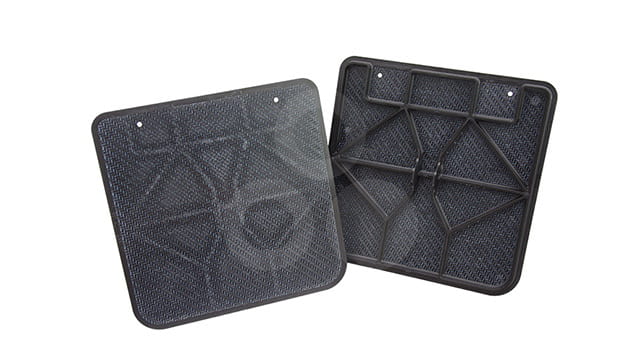Inspection flaps with composite overmolding
If the mechanical requirements are particularly high, continuous fiber-reinforced sandwich components based on resin or even metal components are generally used. Economical, functional, and lightweight components are especially in demand in the automotive and aerospace industries. At the same time, the pressure for sustainable, recyclable products is also increasing.
In collaboration with Engel, Ensinger offers a complete solution that is lightweight, high-strength, versatile and environmentally friendly. TECATEC organic sheets used as a thermoplastic base are molded into high-strength structural components using the organomelt process developed by Engel. In the same process step, functional elements from the same material group as the matrix material are molded on. This opens innovative design concepts, fields of application, and contributes to sustainability due to the purely thermoplastic material approach.
Production of purely thermoplastic composite components with functional integration
With this technology, functionalised PEEK parts with complex structures such as inspection flaps can be produced efficiently and automatically in large quantities.
The Ensinger TECATEC composite of carbon fibres with an LM-PEAK matrix (LM meaning low melting) is heated and formed into a component using special thermoforming tools. This thermoformed composite can then be overmolded with fastening elements made from the higher-melting polymer PEEK in the same process step. This enables the production of fully functional, tool-ready components that would otherwise require complex manufacturing and joining processes necessary with thermoset composites.
Advantages at a glance
Shaping and functionalisation in one process step
All in one - economical, functional, versatile
Sustainable recycling concept thanks to purely thermoplastic materials
Weight saving through thermoplastic composite lightweight components
Opportunities for the mobility of tomorrow
High-strength, purely thermoplastic components have not only established themselves in the automotive industry, but the thermoplastic lightweight composite parts are also attracting interest in other sectors such as aerospace. They are increasingly replacing thermoset or metallic structural parts and components for passenger cabins as well. Sustainable polymer solutions are destined for numerous applications in passenger aircraft, drones, and UAVs.
Do you need help with your application?

